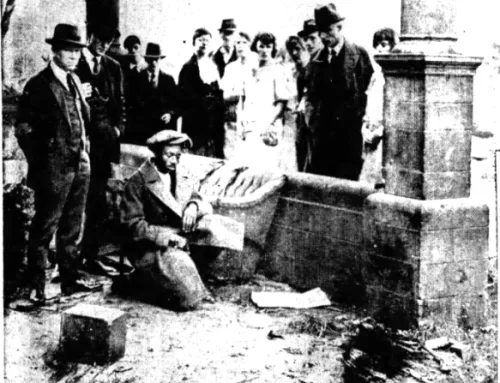Aguirre was motivated to get involved locally and feels her time at Carnegie Mellon in the School of Architecture paved the way. “The city was my campus.”
By Tracy Certo
When Lucia Aguirre arrived at Carnegie Mellon University in the summer of 1995, she had a softer landing than most. Her entry was aided by a program called “Summer Freshmen” in which she and 12 other students started classes early, in a more intimate setting on a quieter campus for six weeks.
Born and raised in Mexico City, Lucia had recently moved with her family to San Diego, but didn’t feel she fit in. At Carnegie Mellon, she says, she felt accepted in the small group of students – who came from all over the U.S. and other countries—and got the guidance necessary to acclimate to the campus and beyond.
“This was so powerful for me,” she says over coffee at the Starbucks in the Fairmont Hotel. “It made a difference.” She knew of other international students attending other universities who felt out of place and left.

One summer, Lucia got to travel with a group of students to Europe to study architecture with the renowned and revered architect and professor David Lewis, now deceased. When it came time to graduate, a colleague suggested she apply to a local architecture firm that had an opening. She did and landed the position. Today she is an accomplished architect and client manager at LGA Partners, an architecture and design firm which recently moved its 80-plus employees to Gateway Center Downtown.
She is still getting used to—and enjoying– her new work location. But the fact is she loves Pittsburgh and every one of the five neighborhoods where she has lived and worked. Even now, 24 years after setting foot on the Oakland campus, she tears up when talking about her adopted city.
She loves the three rivers, the four seasons and the fact that Pittsburgh forged such an impressive comeback after the steel industry’s collapse decades ago. She first learned about the industrial demise that gutted the city in Carnegie Mellon’s famed Urban Studio.
“It’s a vibrant city and also a work in progress with more to be done. I wanted to be part of it.”
Which didn’t mean it was easy. She was challenged—both as a woman and certainly as an immigrant—and as a result has always felt the extra pressure of excelling. It’s not just to prove herself but to make it easier for other women from Mexico who might follow in her path.
“You want that acceptance,” she says, offering that she was a girl scout which served to reinforce her already strong sense of duty. “It elates you.”
She tells of an incident early in her career where she was provoked by a client who told her point-blank that he didn’t trust her on the design project. She chose to keep that comment from her boss and noted that the client communicated with him even though she was the point of contact. It was demoralizing.
She worked extra hard, as always, to prove herself on that project which was not only deemed a success but was spotlighted in a trade magazine. While the client later apologized, the incident left a mark.
“I get emotional,” she says with eyes glistening. “I wish he knew how much stress he put me under.”
The tendency to prove herself above and beyond drives her still, with two decades of solid experience in her field.
She was motivated to get involved locally and feels her time at Carnegie Mellon in the School of Architecture paved the way. “The city was my campus.”
She started biking because of a guy she liked. While the relationship didn’t pan out, she gained a lifelong love of the sport and got involved with Bike Pittsburgh.
Twice she biked the 335-mile Great Allegheny Passage (GAP) trail from Pittsburgh to D.C. On the second trip, she stopped at a camping site late one afternoon for a break and a ranger came by and greeted her. When she responded, with her usual cheer in her usual accent, he asked to see her license.
‘”’Where are you from?’ he asked. Pittsburgh, I said. ‘No, where are you from?’ he asked again. ‘Where are your papers?’ He told me he was going to check out my license and then asked, ‘Do you have any weapons?’
“I told him I wasn’t planning on staying overnight. I was low on cash and needed to get to town to get some. He told me to leave, and I was near tears.
“Then a wonderful woman with her family came over and asked the ranger, ‘What’s going on? Why are you checking her out?’ There are guys partying in another campsite you should be checking out instead.’
“Then the woman said to me, ‘You’re not going anywhere.’ She paid my camping fee for the night and then later shared a pizza with me.”
It was a good ending to a sad, and sadly not uncommon, story for those who speak with accents, but Lucia’s focus was clearly on the woman who rescued her, not the ranger.
That same year, she notes, she quit smoking and took up running, eventually finishing two half marathons and then reaching her goal of completing a full marathon in the city’s annual race.
Along the way, she has also been active in professional organizations as well, such as Women in Design – where she cheers seeing the younger women from Mexico and other countries these days — and in AIA Pittsburgh.
Just as it was back in her college days, Pittsburgh is still a work in progress. Today, Lucia is in a much better position to be part of it.
In 2017, the architect was named to the City’s historic review commission, appointed by the mayor and approved by City Council. The seven-member commission has control over any proposed construction or demolition in an historic district and exterior work to any historic landmarks. Lucia chairs the commission and has served two consecutive three-year terms (but under the new mayor has yet to be officially reappointed for the third term).
“One of the greatest advantages Pittsburgh has is its great geography and access to nature and rivers,” she says, along with “a very diverse and rich history in all matters, from arts, culture, and buildings, to workers’ rights and education.”
She credits the immigrants who came from all over the world to make it their home and the ‘promised land’ to a new life. Like hers.
“I think many of my classmates who left Pittsburgh would be amazed to see how certain neighborhoods have evolved or are thriving now.”

The work that needs to be done, she says, is to make this city livable in an equitable way, a place where all residents can thrive. “By doing that, it honors that diversity from years past –what made Pittsburgh the “Hell with the Lid Off” — and what it is now.
“It’s buildings and communities still have many stories that are waiting to be told,” says the architect, “and it will take everyone to honor them.”
Lucia, her husband, and their six-year-old son live in Greenfield, and she travels frequently designing airport lounges and retail space including in Kansas City, San Francisco, Dallas and Nashville. She loves her job and her travels to other cities but is always happy to return. “It is my home,” she says, tearing up again.
Does she think Pittsburgh has a good diversity of foreign-born residents?
“In my 20-plus years in Pittsburgh I have met folks from all over the world – from Russia, Belarus, Portugal, Spain, South Africa, Nigeria, Serbia and Montenegro, Poland, Japan, Ecuador, Mexico, Colombia, Belgium, Canada. I think there is good representation overall, and that’s because the city has been welcoming to us. I hope that diversity continues moving forward.”
Her advice to any foreign-born person new to Pittsburgh is to get involved. Lucia seems to meet opportunity at every intersection and takes full advantage. One of her many interests is acting — at one time she aspired to be on stage—and she has worked as an extra on Wonder Boys, Third Knight Rises and Out of my League. Once, she had a play accepted by Pittsburgh Works Festival.
As if she realizes her zest for a full and varied life is quite out of the ordinary, she pauses, then adds quietly, “My experience is very much dictated by my attitude. It’s such a privilege to be here. I love this city and everybody knows that.”
This story is part of The New Americans, a project of Pittsburgh Tomorrow, which seeks to reverse population loss through revitalization. See more stories here.
Tracy is the founder and Editor at Large of NEXTpittsburgh which she started in March 2014 and sold in December 2020. She is passionate about making Pittsburgh a better place for all and connecting people to do the same.






